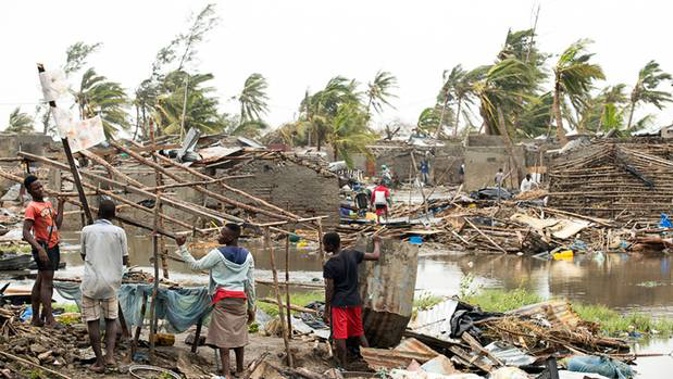
More than 1000 people were feared dead in Mozambique four days after a cyclone slammed into the country, submerging entire villages and leaving bodies floating in the floodwaters, the nation's president said.
Cyclone Idai is believed to be the most destructive storm to hit the impoverished southeastern African country in more than 10 years.
/arc-anglerfish-syd-prod-nzme.s3.amazonaws.com/public/4GGR35W2JJE4DFO4TROEFTNU7Q.jpg)
Speaking on state Radio Mozambique, President Filipe Nyusi said that while the official death toll stood at 84, "It appears that we can register more than 1000 deaths."
Nyusi spoke after flying by helicopter over the Indian Ocean port city of Beira and the rural Manica and Sofala provinces, where he reported widespread devastation.
"The waters of the Pungue and Buzi rivers overflowed, making whole villages disappear and isolating communities, and bodies are floating," Nyusi said. "It is a real disaster of great proportions."
/arc-anglerfish-syd-prod-nzme.s3.amazonaws.com/public/NRLBRQYMDRDKDCIHMMSX6D3WEA.jpg)
Emergency officials cautioned that while they expect the death toll to rise significantly, they have no way of knowing if it will reach the president's estimate.
The cyclone hit Beira late Thursday and then moved inland to Zimbabwe and Malawi with strong winds and heavy rain.
The Red Cross said 90 per cent of Beira, a city of 500,000, was damaged or destroyed. The cyclone knocked out electricity, shut down the airport and cut off access to the city by road.
The scale of the damage in Beira is "massive and horrifying," said Jamie LeSueur, who led a Red Cross team that had to assess the damage by helicopter because of the flooded-out roads.
More than 215 people have been killed by the storm in the three countries, including 89 in Zimbabwe, according to official figures. And hundreds more were reported missing.
UN agencies and the Red Cross helped with rescue efforts that included delivering food and medicine by helicopter in the impoverished countries.
/arc-anglerfish-syd-prod-nzme.s3.amazonaws.com/public/U2YYXWIOZZGMLAM5MIHQ3IZJAI.jpg)
Mozambique is a long, narrow country of 30 million people with a 2400-kilometre coastline along the Indian Ocean. It is prone to cyclones and tropical storms this time of year. It was hit by severe flooding in 2000.
The country won independence from Portugal in 1975 and then was plagued by a long-running civil war. Its economy is dominated by agriculture, and its exports include prawns, cotton, cashews, sugar, coconuts and tropical hardwood timber. More recently it has been exporting aluminum and electric power.
Take your Radio, Podcasts and Music with you









